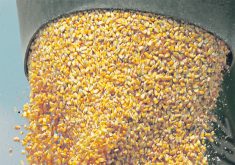A host of economic and financial problems threaten the commodity market rally that has driven crop and meat prices to record highs in the past year.
However, many analysts doubt that those problems will come together to snuff out world economic growth and recovery. And agricultural commodities have the best chance to ride out any coming storm, say some leading commodity market analysts.
“It’s one of the most recession-proof industries we have,” said Peter Hall, vice-president and chief economist of Export Development Canada.
Read Also

Methane tractor debuts at Agritechnica 2025
New Holland has unveiled its production-ready version of a T7.270 methane-powered tractor at the Agritechnica farm machinery show in Hanover, Germany.
“I would say the long-term story is that we will see upward price pressure generally in food.… What we could see as a result of (a possible economic) disruption is a switch back to more basic grains and away from meat, or to cheaper meats, for this period, until we get to a point where we feel we’re back on our feet.”
David Hightower, author ofThe Hightower Report,thinks agricultural prices will be relatively strong, even if the overall commodities complex falls back temporarily.
“Commodity prices will probably fall off over the next two to three weeks as we have got some (economic) slowing evidence and some speculative premium money coming out of the equation, but … when you look at the grain markets, this is a multi-year tightness,” said Hightower.
“We really don’t know what we have this year, and even if we do have some favourable production, you’re still going to have a very tight scenario.”
History suggests that prices will be supported as long as demand continues for consumer goods and food, regardless of overall economic conditions.
However, the story won’t necessarily end happily for farmers if demand slumps because much of the price level for crops and meat comes from trends in the overall commodity market.
Some analysts have said more than 80 percent of the price action of agricultural commodities comes from the overall commodity complex.
Hall and Hightower agree that crop and meat prices are likely to be stronger than other commodities if there is a slump. But they have opposite views on the overall commodities complex. Hall is generally bearish and Hightower generally bullish.
To Hall, a daunting list of challenges could kill the demand that supports commodity prices, including crops and meat:
• financial crisis in a number of euro zone countries;
• generally weak financial markets and banks around the world;
• the end of economic stimulus measures that rescued many economies from the lingering recession;
• inflation and inflation-control measures in countries such as China;
• general nervousness around the planet, which could directly affect consumer demand and commodities consumption.
“If nervousness persists, this long after a recession, any bump that comes along could get the consumers of the world withdrawing from the economy in a way that would be really destabilizing,” said Hall.
Two more dangers have erupted in the past six months, which are true wild cards:
• natural disasters that have rocked Australia, New Zealand, Japan and disruptive weather from China to the United States;
• political turmoil and instability that has gripped the Arab world.
Hall said he thinks the world’s economy has come close to a pivot on which it will turn from present weakness and struggle toward sustainable long-term economic growth.
However, the long list of troubles facing the world reduces the chances that it will successfully make the turn.
“You would think that if we’re getting to that balance point, that the risks would actually be declining, (but) our risk list is growing,” said Hall.
“It’s growing by things we can’t predict.”
Hall said the biggest threat to commodity prices, other than slowing economic demand, is the fact that, from oil to copper, world inventories are generally flush and prices are high relative to supply.
“I, for one, feel prices are very unrealistic compared to the true state of demand,” he said.
“Prices are rising in an environment where, by and large, inventories are high.”
Hightower believes short-term factors could knock down commodity prices, such as the coming statistics on U.S. job and unemployment numbers for June, which could verify that the U.S. economy is slowing.
“That’s going to be very critical because it could be a sentiment killer,” said Hightower.
However, he thinks world commodity demand won’t slump because it isn’t a fickle thing that can be easily reduced. He doesn’t believe prices are too high or inventories large.
“I think there is a little bit of a misconception that commodity demand is elastic,” said Hightower.
“It’s proven to be more of a primary need.”
While Hall thinks commodity prices could fall a lot because of over-valuation, Hightower sees a short-term setback before a return to strength.
“I think you may have a little bit of near-term weakness here, but you get in later in the year and you’re going to catch back up,” said Hightower.
“We’re going to start chewing through what we have, and most of these markets are more tight than they are flush with supply.”
Hall expects the world to soon enter a new period of acceleration, but it will have to surmount the present problems before it can reach sustainable growth.
“Any one of these could trip us up and keep us from getting to that balance point,” said Hall.
The world remains vulnerable until we get to the balance point.”
———
“access=subscriber section=markets, none, none















